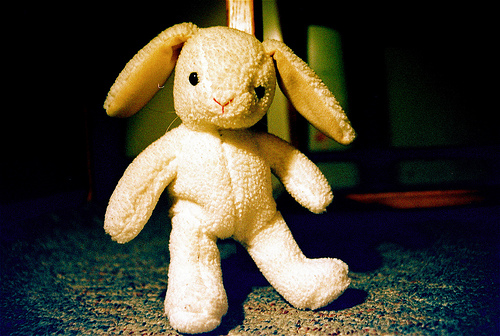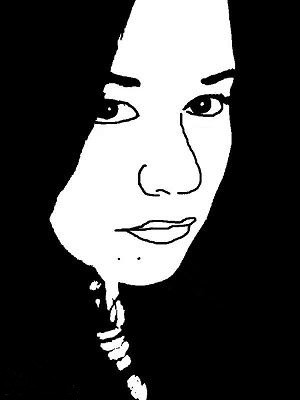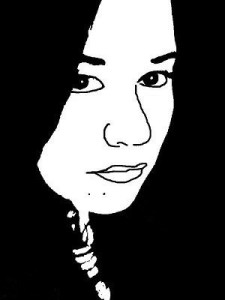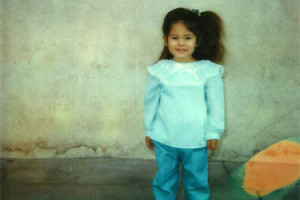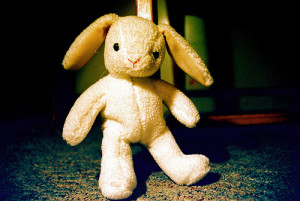
As I wandered around a local craft festival last November, my mind was on my seven-month-old niece. I wanted to give her a Christmas gift that was thoughtful, soft, and sweet. When I’d almost given up hope, I spotted a small stand outfitted with handmade stuffed animals that, upon further inspection, were all velveteen. This, I decided, was the softest, sweetest thing I could give my baby niece.
I picked out a gray rabbit with long, floppy ears. I envisioned the little girl snuggling up to her new sleeping companion, a subtle yet constant reminder of her loving aunt. Unfortunately, this idyllic picture would not come to pass. A few weeks after I bought the bunny, I got a phone call from my brother that irrevocably changed our relationship.
The days leading up to the call had been sleepless and emotional. My brother disappeared for three days, leaving his pregnant girlfriend in a state of panic. She and I were in constant communication, and feared something horrible had happened when my brother didn’t answer his phone and was nowhere to be found. He had left late at night, saying he had an errand to run, and no one had heard from him since. The thing is: this wasn’t the first time this had happened. Actually, it happens all the time because my brother is an addict.
When he re-emerged, my brother called me and acted as if nothing had happened. His girlfriend and I, he insisted, were simply overreacting. I couldn’t pander to his addiction-driven whims anymore, but I didn’t want to turn my back on my family. I didn’t want to give up hope that my brother could get clean.
I tried to set healthy boundaries by telling my brother I was worried about his well being. I tried to make a plea for the safety of my niece. Within moments, our conversation exploded. My brother yelled. I yelled back. He said I was unlovable. I called him a junkie.
Accusing an addict of being an addict is a surefire way to end a conversation. But I was so tired of feeling taken advantage of. I was through with my brother’s lies and enduring his verbal abuse. There is a particular exhaustion that comes from fear-based worry, a specific kind of anxiety that manifests during the hours of wondering when the phone will ring with the news of my brother’s self-imposed death. Desperate to make this misery end, I told my brother never to contact me until he was ready to seek treatment.
I drew a line in the sand, so my brother drew one of his own. He cut me out of his life completely and banned me from contacting his children. He warned that if I sent Christmas presents, he would burn them. And I knew I should believe him.
When my brother hung up on me, my heart broke open and filled with regret. Although I knew I needed to look after my own emotional health, I couldn’t shake the feeling that I’d made a grave mistake.
Instead of ridding myself of the unhappy relic, I kept the velveteen rabbit in a bag near my bed. The tender toy was a sad reminder of the ways my family was disappearing. Two years before, my mother died suddenly of a heart attack after spending her final years in a state of depression I knew intimately, but didn’t know how to address. In the midst of my grief, my older brother’s alcoholism proved too much for me to handle. One day, we stopped speaking and still haven’t reconnected. I found it excruciating for my intimate world to be shrinking so quickly, but then something happened that changed my perspective.
While writing a magazine article on addiction and rehabilitation, I discovered a program that had been operating discreetly in my hometown in California for almost thirty years. Located on a tree-lined street in Downey, a small Los Angeles suburb, Woman’s Council is an outpatient rehabilitation program for mothers for whom treatment of active addition is a court-ordered condition to regain custody of their children — and it was changing lives.
When I visited Woman’s Council, I had already spent three months observing Narcotics Anonymous and Alcoholics Anonymous meetings, visiting recovery centers around the city, interviewing recovering addicts, and speaking to counselors and medical professionals about the process of getting clean. But my first encounter with this program blew me away.
Sitting around a circular table, women gathered four times a week to share their stories, vent their frustrations, investigate their personal psychological triggers, and purge themselves of their chemical demons. During each woman’s time to speak, she revealed every hardship and heartbreak, every triumph and tragedy she had endured that lead to current circumstance. The group was facilitated by trained counselors who had their own experiences with addiction, and they provided guidance on how they overcame their own challenges early on in recovery. Despite participation being mandated by the judicial system, the women I spoke with all reported that the program was crucial to their well being.
Week after week, I sat silently in that meeting room and took notes on a legal pad. Although I tried to maintain a professional distance, at times I had to excuse myself and run to the bathroom before my sobs broke through. As I gasped for breath in the stall, a series of emotions ran through me: devastation at the horrifying misfortunes these women had endured, anger at the trauma their addictions had brought upon their children, sorrow for my brothers, myself, and my family. But I always returned to the room with as blank a face as I could muster and forced myself to listen more.
I knew something powerful was happening in that room because something powerful was also happening to me. In empathizing with the mothers in Women’s Council, I was learning how to empathize with my brothers as well. I was beginning to understand the stigma of addiction and how cycles of abuse get perpetuated. Having myself abused drugs and flirted with disaster in an abusive relationship, I saw that the biggest thing distinguishing me from these women was that I’d had a little more luck.
When my article was published last December, I gave the velveteen rabbit to a woman named Nicole who I’d met at Women’s Council and had an daughter named Sofia who was the same age as my niece. Despite it being an unceremonious act of giving, I felt extremely moved by the exchange and became the Women’s Council’s first regular volunteer. I jump in where ever I am needed, cooking food for the graduation ceremony or helping with administrative tasks. My hope is that I can make a difference in the lives of these women in a way I wasn’t able to in my own family.
Before I began volunteering, I had to sit with my family experiences as though they were secrets. I still haven’t reconciled with either of my brothers. But now, whenever I enter the Women’s Council building, their lives and mine make a little more sense and are less cruel in equal proportion.
- Follow us on Twitter: @inthefray
- Comment on stories or like us on Facebook
- Subscribe to our free email newsletter
- Send us your writing, photography, or artwork
- Republish our Creative Commons-licensed content

